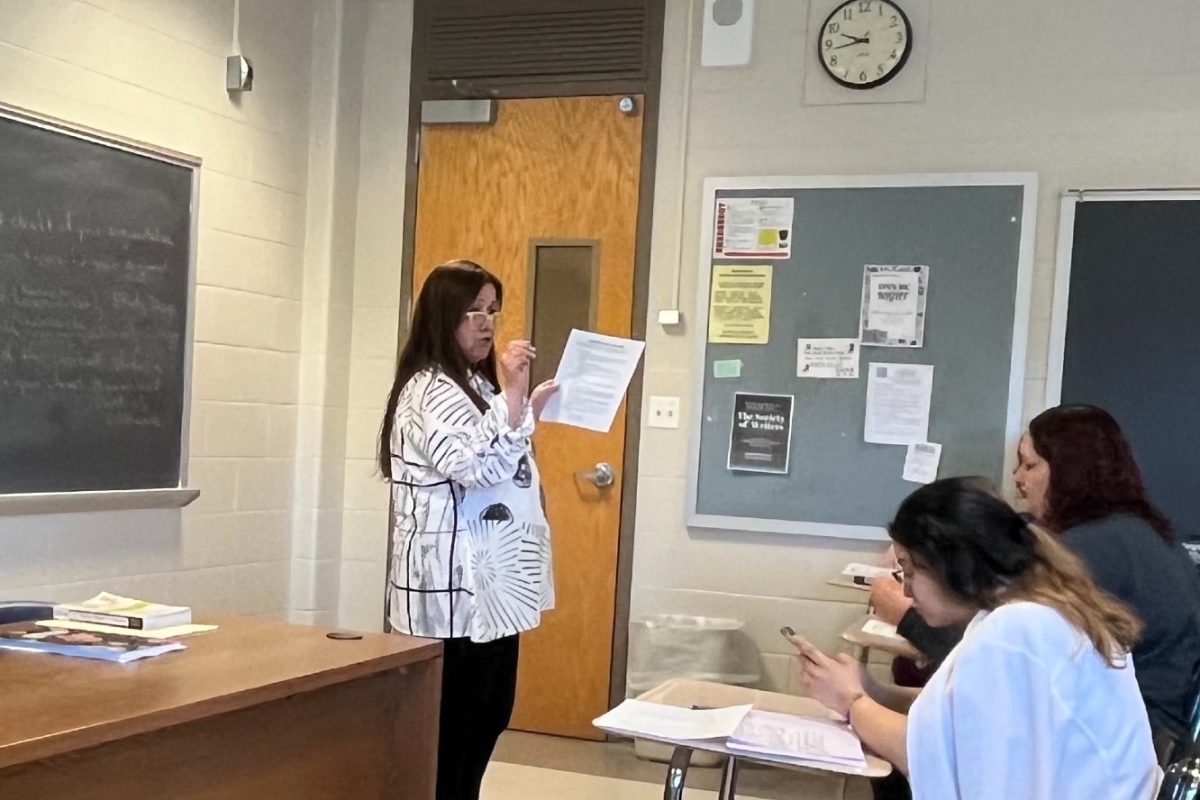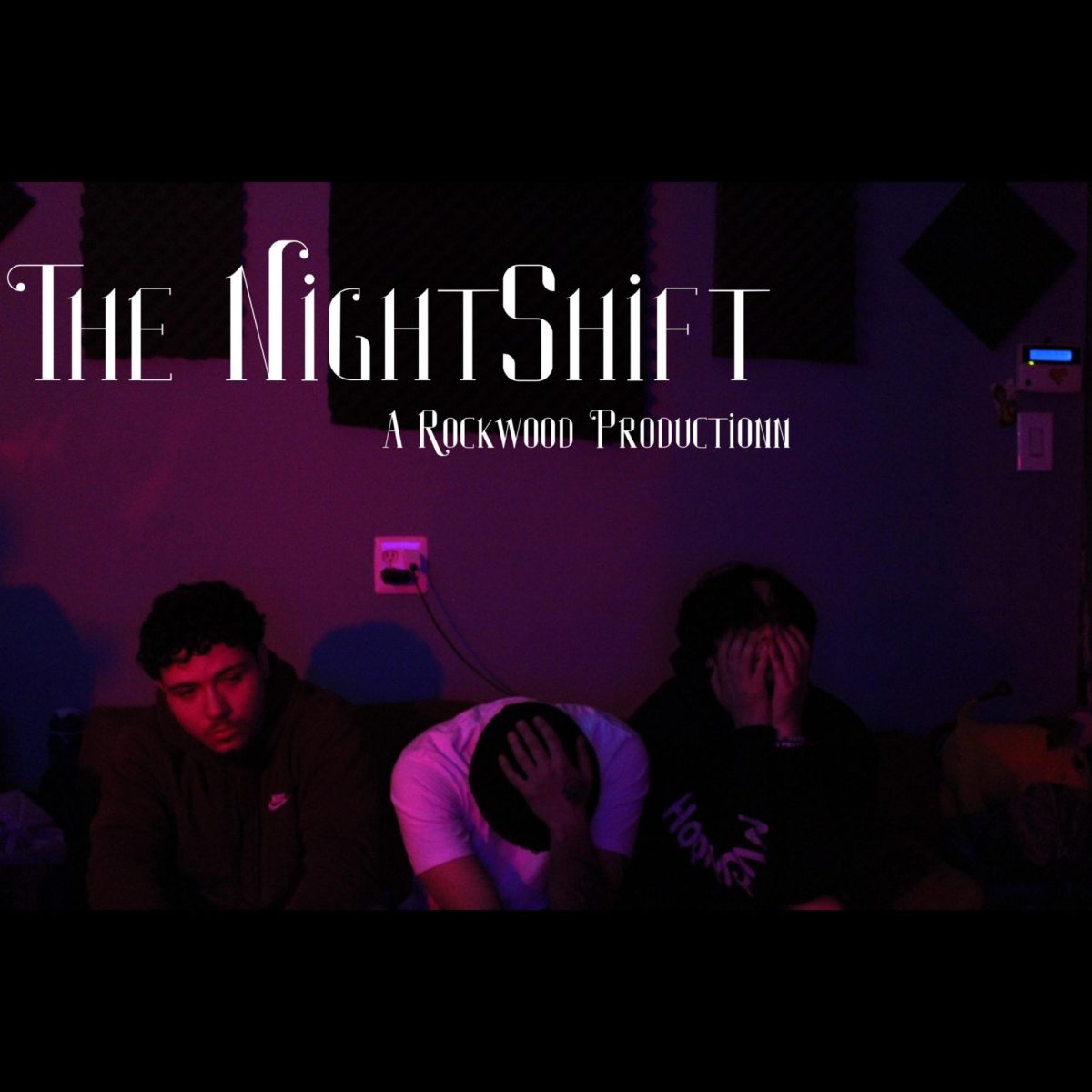Weyes Blood: ‘And In The Darkness, Hearts Aglow’ Album Review
Natalie Mering releases her fifth album, the second in a trilogy under Sub Pop Records, following her 2019 release Titanic Rising, a beautiful continuation into the artist’s shift to chamber-pop songwriting
December 6, 2022
Is love possible in the apocalypse? How do you navigate a society shifting into isolation? Are we past the worst of these times? These are questions Natalie Mering (Weyes Blood) has been trying to answer. She looks for these answers in And In The Darkness, Hearts Aglow. Though to understand this album you have to start from the beginning, Weyes Blood’s 2019 release Titanic Rising. In 2018 after signing with Sub Pop Records, Mering was witnessing an overbearing amount of change in the world, online dating killing romance, technology stealing people’s attention, and a fleeting lack of meaning in the world. Because of this, she set out to make a trilogy about how the world is changing for the worst and how little she feels she can do about it. Titanic Rising is an observation of this oncoming doom and And In The Darkness, Hearts Aglow describes not only being in the thick of the mess, but also acknowledges that society is past the point of no return, so the album is about making the best out of this tragic situation.
Musically And In The Darkness, Hearts Aglow closely adheres to the same sound as Titanic Rising with influence from the late 60’s psychedelic and 70’s chamber-pop such as Harry Nilsson and Karen Carpenter. Mering’s influences are also very blatant on this record from experimental roots to liturgical music elements. Across the record the listener will find Mering’s voice rising above and shining on many tracks in a divine way. The backing vocals and an accompaniment of organs and bells scattered across the record give it its grand, spiritual atmosphere. The average track on this album runs well over five minutes but is so full and encaptivating that it never feels like it is dragging on.
The first track and lead single off the record, “It’s Not Just Me, It’s Everybody,” is a 70’s style Carpenters-esque piece with a quiet piano and drums that allow Mering’s crystal-clear voice to be the center of attention. This song sets the stage for the second act of this trilogy by throwing the listener right into the aftermath of the changes described in Titanic Rising with Mering singing: “Living in the wake of overwhelming changes / We’ve all become strangers.” The singer makes the point here that the emotions she feels about the changes in society—isolation specifically—are shared by everybody. The track ends with Mering repeating the same line “It’s not just me, it’s not just me, it’s everybody” almost as a mantra, serving as a reminder that there is an interconnectedness and humans are going through all this together.
The song “Children of the Empire” is an anthem about the newer generations trying to fix the problems caused by past generations. Mering sees that the older generations are uncaringly pushing the consequences of problem like climate change on the younger people:
We tend to live long
That’s why so many things go wrong
People selling their young blood
I guess that’s the price you pay
This song is a call to action, indicating that the children of this new generation have to tackle these problems whether it scares them or not, and Mering is telling them to be brave.
The next song, “Grapevine,” starts as a quiet acoustic track that builds up slowly into a grand heavenly piece with the room filling sound of chimes. With distorted lyrics mixed into the sea of sounds that come in the choruses, the listener can get blissfully lost in the grandness of the piece. In an introduction to the new record on Bandcamp, Mering writes: “Technology is harvesting our attention away from each other. We all have a “Grapevine” entwined around our past with unresolved wounds and pain. Being in love doesn’t necessarily mean being together. Why else do so many love songs yearn for a connection?”
Then comes “God Turn Me Into a Flower,” a slow track powered by a heavy sustained organ and numerous layers of background vocals. Some of Merings most powerful vocal performances on the record are featured in the first half of the song. Mering bases this song off the myth of Narcissus, who at the end of the myth is turned into a flower. Mering does not wish to be self-centered like Narcissus, but sees the outcome of his actions, turning into a flower, as something to be sought after. In an interview with Fader magazine she says, “In order to withstand huge geological shifts, you want to be soft and pliable. There’s a pliability and softness to a flower, and it’s also a catharsis: If there’s nothing we can really do, that’s fine too. We can just be nature, because that’s what we really are.” The song ends with a three-minute outro with no lyrics but instead is filled with miscellaneous nature sounds, such as bird chirps and frog croaks. This is the longest period without any singing on the record, symbolizing Mering giving up her human qualities to return to nature. These sounds keep getting added on top of each other until they are an unrecognizable mess. This foley-heavy outro acts as homage to Mering’s roots in the experimental music scene.
In the title track of the album, “Hearts Aglow,” Mering sings about finding love in these uncertain chaotic times, and how it can be a necessary distraction. The lyrics describe two people going out and riding a Ferris wheel together by the water. Being with this person makes the singer forget about everything that is going on around them; however, there is always the “dark water down below” looming over their lives. The listener can hear the sincerity at the start of verse two with the lines:
Might be the moon or the cotton candy
Or it might be a man
Who actually understands me
‘Cause it’s been a death march
The whole world is crumbling
Even at this most uplifting point on the entire album, Mering still feels the need to describe and point to the world crumbling around her, making it clear across the album that this is truly an overwhelming feeling that she can’t shake.
The song “Twin Flame” stands out, sonically, from the rest of the album with a slow-tempo drum machine and cold-electronic-sounding synths similar to those of Phil Collins or Trent Reznor. The lyrics show a relationship where the singer seems overly attached while the partner is extremely distant. This leaves the singer wondering what they did wrong to deserve this treatment from their soulmate—or twin flame—when in reality they just are not compatible. This track is not the most groundbreaking in terms of theme or structure, but does add a bit of needed variety on the album.
Over the past decade and specifically during the COVID-19 pandemic, people have been growing increasingly isolated. The jaunty track “The Worst Is Done” discusses the positive feeling society had post-COVID lockdowns, with many people thinking that it is a hill we got over and are past. However, Mering sees the lockdown as a glimpse into the future, implying that, if humans keep going in the same direction of online dating, work-from-home jobs, and social media we are surely on a path to a world even more isolated than we have ever felt. The artist explains her observation with the phrase: “We sleptwalked through the years / Didn’t think we’d all lean into hyper-isolation.” Musically the track is upbeat with a punchy drum and bright acoustic guitar, this is to represent the positive feeling society is having after the lockdowns.
The final track is “A Given Thing.” This song brings everything back to the beginning of the record, with simple piano chords accompanying Mering’s calm, smooth voice. Much like “Twin Flame” this song also comments on a relationship that isn’t working. The lyrics come in an almost explanatory way, with Mering making it unclear if she is talking to herself or her partner: “It’s not something you gotta earn from each other / It just comes naturally, it’s there for the taking / It’s a given thing.” These lines come as advice to the person in the story who is struggling—most likely Maring her past self. She feels like she needs to earn the love of her partner, and because she does not receive that love it makes her believe that she is not doing enough. Mering is trying to make the point that the person in this relationship needs to understand that love should come naturally and not be something earned from a partner.
Sonically And In The Darkness, Hearts Aglow might be too similar to Titanic Rising for some, but to sound like that record is not something to complain about. This album functions exactly the way Mering set out to make it. With the ability to stick to its themes the album not only lives up to its acclaimed predecessor but also leads to great anticipation for what will come next from Weyes Blood.
Rating: 8.8/10
Favorite Tracks: “Hearts Aglow,” “The Worst Is Done,” “God Turn Me Into a Flower”
Least Favorite: “Twin Flame,” “A Given Thing”





























































